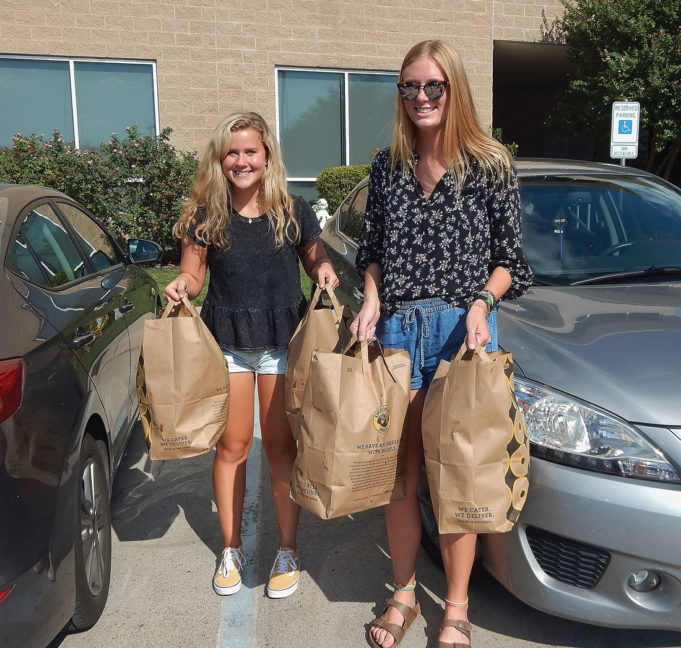Late last Friday afternoon on East Lancaster Avenue, TCU senior Josie Johnson pulled her Hyundai Elantra into the Union Gospel Mission, a nonprofit serving the homeless community in Fort Worth with food, shelter, and educational programs. She hopped out of the driver’s side while her friend, Ellie Buss, another TCU senior, stepped from the passenger seat. Johnson opened the rear door of the sedan and took two large Einstein Bros. Bagels bags from the seat and handed them to Buss. Johnson took out two more and the two women put them on a waiting cart wheeled out of the mission kitchen by a volunteer.
“There wasn’t much today,” Johnson said. “But it’s still something.”
Johnson and a group of TCU students make a similar run to Union Gospel each Wednesday and Friday during the school year. They first stop by the TCU dining hall kitchens to pick up any unused but edible food, then head over to the athletic training tables to collect the leftovers there, then stop by the Einstein shop on campus for extra bagels, and then bring it all over to the mission. Some days, like Friday, she has only about 20 pounds of food to offer. Other days, the group might have 100 pounds. All of it is welcomed by the mission, which serves about 400 meals to the area’s hungry three times a day.
“The food can be anything from fried chicken to lasagna,” Johnson said. “It might be sandwich materials, or potatoes, or eggs. Lots of the time it’s whole meals. And then there are the bagels.”
The TCU project is a chapter of the national effort called the Food Recovery Network, a nonprofit that operates at 200 U.S. colleges and universities to collect food that would otherwise be headed for landfills and put it in the hands of hungry people.
The program started more than a decade ago when students at the University of Maryland at College Park realized how much good food was being tossed in the trash daily. “It was just a couple of college kids trying to do something good,” said Regina Anderson, the network’s executive director. “They recovered the food and distributed it to people who needed it, and then one of those students told someone at Brown University about it, and they told someone at [the University of California at] Berkeley, and a college food recovery movement was born.”
The organization became an official national nonprofit in 2011, and since that time, it has recovered 3.9 million pounds of food. “We ask the providers to weigh it and wrap it up for our students, so we have an idea of what we’re actually donating,” said Anderson, who joined the organization four years ago. “And if a school wants to start a program but doesn’t know where to give the recovered food, well, we’ll find a nonprofit for them. The primary condition for receiving the donation is that the organization knows how to handle the food safely. There are rules for collecting the food, as well. Only food that has not left the kitchens can be recovered — no half-eaten sandwiches allowed — and everyone involved has to have a food handler’s certificate.”
The most important thing about food recovery and distribution, Anderson said, is safety. “Our students need to be confident that the food they are giving away is going to be good for the people who finally eat it,” she said. “If they have any doubt at all about the food, we tell them not to give it away. We tell them to do a gut check.”
The chapter at TCU started two years ago. When Johnson, a nutrition major, heard about it, she said she “thought it sounded like a really cool organization. I’d never heard of food recovery and giving it to people who need food, so last year, I worked on the team as a social media outreach person, but when the former head of the chapter graduated, she needed someone to take over, and I applied and managed to get the presidency of the chapter.”
Johnson is ebullient when she talks about the program: “It is just a wonderful program. The people who donate the food, the kitchen crews, love that we get their food rather than having it tossed in the trash, and the Union Gospel loves to get it. And having Einstein give us their extra bagels, well, that’s just fantastic.”
Both Johnson and Anderson hope that other local schools will take up the program. “When you see all of this good food going to waste while people are hungry,” Johnson said, “it just makes sense to put it to use.”
Robert Clethen, food service director at the Union Gospel Mission, couldn’t agree more. “We appreciate everything they do for us, absolutely,” he said.












